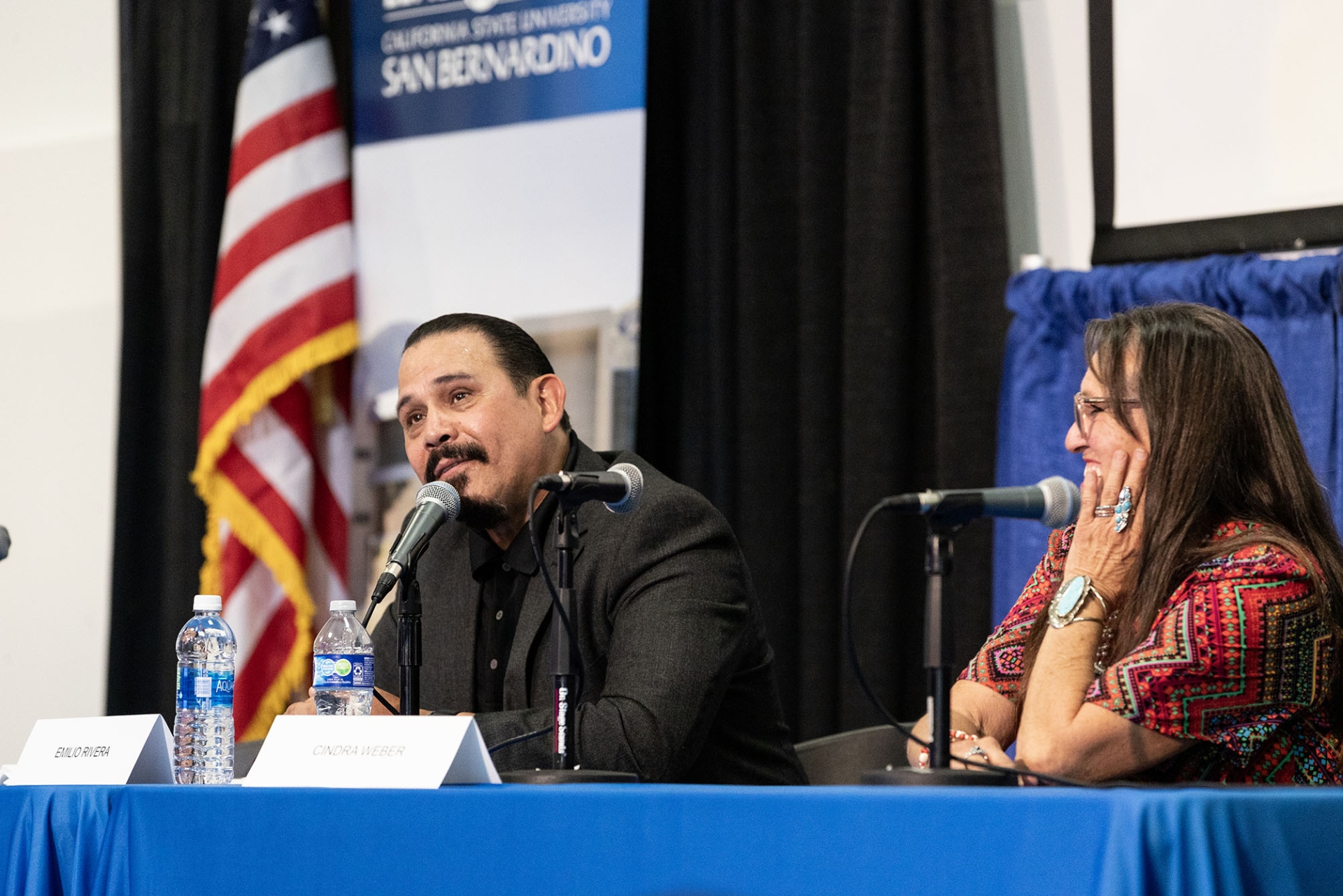Alan Llavore | Office of Strategic Communication | (909) 537-5007 | allavore@csusb.edu
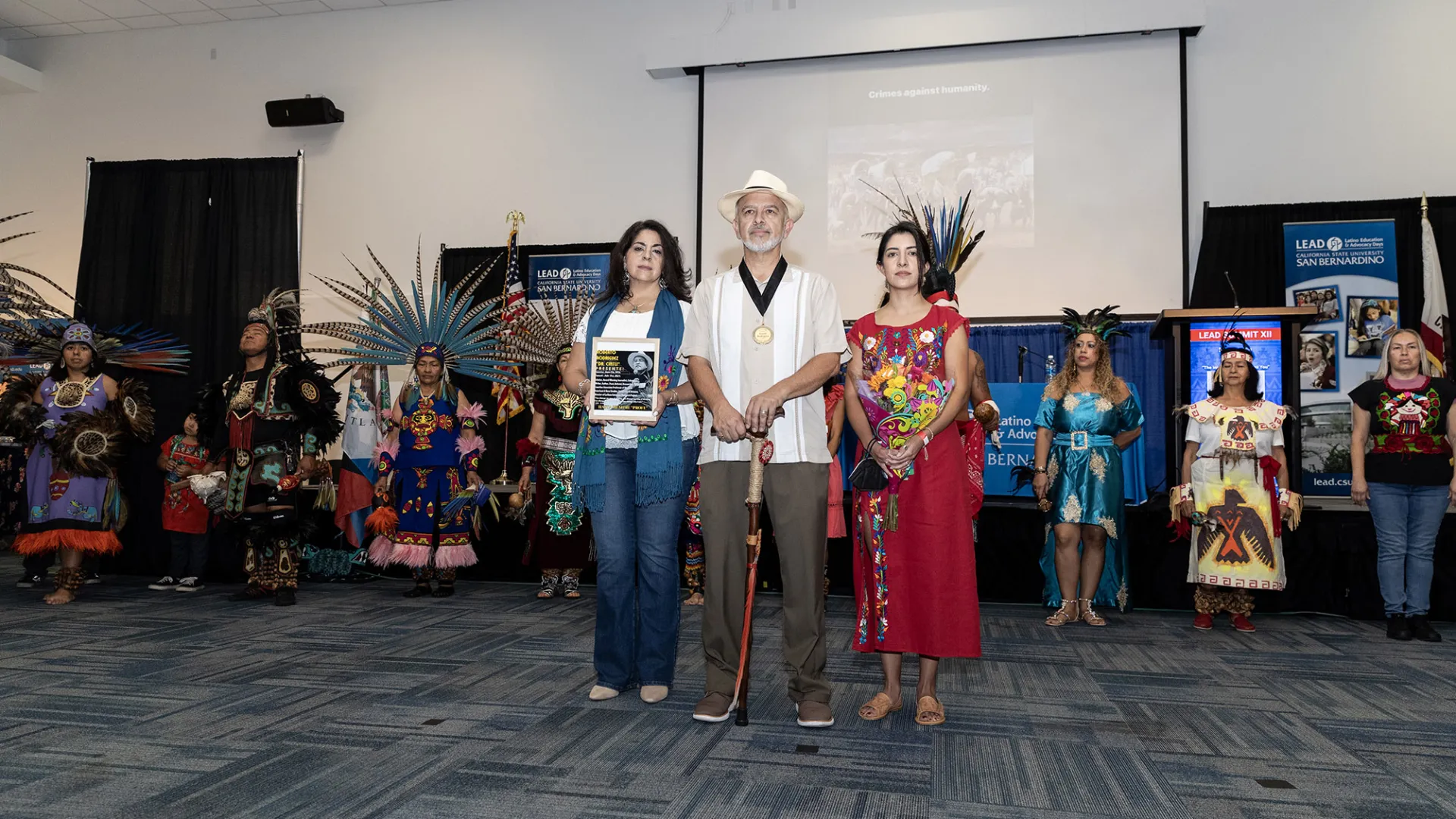

Of the 12 summits held by the Latino Education and Advocacy Days (LEAD), the 2023 conference that focused on the intersection of violence and education had to be the most sobering and heaviest to date.
Throughout the daylong LEAD Summit XII on Sept. 29, with theme, “¡Ya Basta! – Enough is Enough!: Education and Violence in the Context of our Schools, Community Safety, and Law-Enforcement,” attendees listened the history of violence, specifically to the Latino community, to the pain family and friends who lost loved ones, and the ongoing issue of police brutality through the Raza Database Project presentation. Some, because of the subject matter, took advantage of a Healing Lounge to decompress and seek help as needed.
Yet, the 1,300 attendees who filtered through the Santos Manuel Student Union South throughout the day -- and the thousands more who watched the livestream -- also heard calls to action to help stem the tide of violence, the most persistent of which was that education can play a major role.
Each year the summit brings together teaching professionals and educators, researchers, academics, scholars, administrators, independent writers and artists, policy and program specialists, students, parents, civic leaders, activists and advocates – all sharing a common interest and commitment to education issues that impact Latinos to help them define the future.
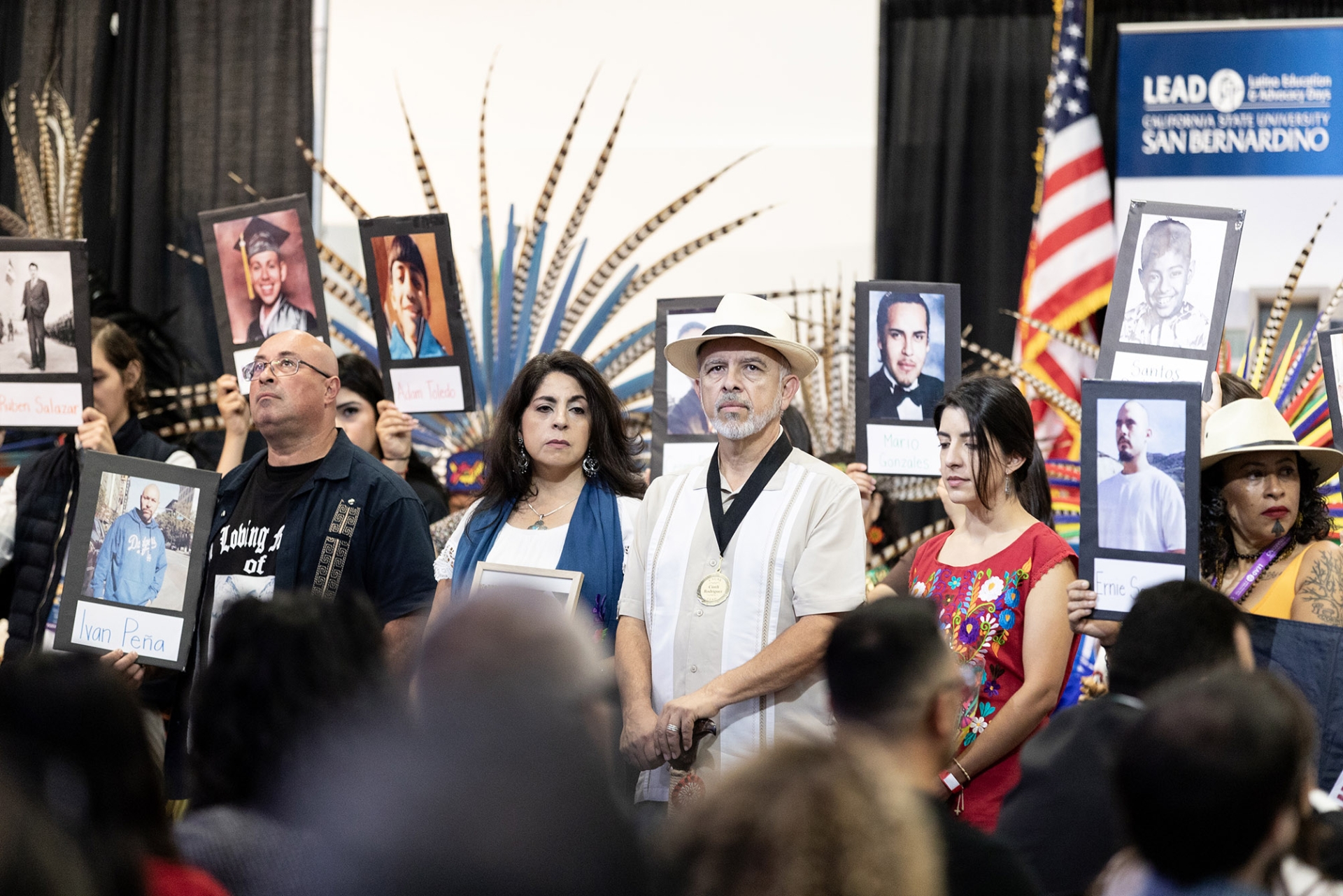
Summit organizers arranged the day on which each presentation built on the previous one. The opening procession, “The Injustice Never Leaves You,” as well as the summit, was dedicated to the memory and legacy of writer, poet, academic, social justice advocate, Roberto “Dr. Cintli” Rodriguez, who passed away over the summer. Rodriguez, former associate professor of Mexican American Studies at the University of Arizona, was the Raza Database Project director. He himself was a survivor of police brutality when he was beaten by Los Angeles County sheriff’s deputies in March 1979 while taking photos on assignment for Lowrider Magazine. The procession was led by his brother, Daniel.
Panel presentations during the summit examined the history of violence against the Latino community and the challenges the community faces: “Violence, Learning, and Generational Trauma (and Healing)”; “From the Massacre at El Porvenir to El Paso to Uvalde: State and Hate Violence against Latinos in America”; “Missing and Murdered Indigenous People: Addressing the MMIP Crisis”; and “Gun Violence Prevention: Students Need Safe Environments to Learn, Live, and Grow.”
The concluding panel, “Police Use of Excessive Force/Raza Database Project,” presented a stark reality: From 2000 to 2022, the project’s researchers, culling from several public sources, counted 33,088 deaths at the hands of law enforcement. And that number, researchers said, could be an undercount because of the lack of uniform reporting and a centralized database.
And it’s not just about the victims. Ivette Xochiyotl Boyzo, La Raza Database Project research manager and community activist, said families and whole communities suffer as well. “The thing about violence is that it’s (cumulative) when someone gets killed,” she said. “Let me tell you, this is why impacted families must always be at the forefront and center of these conversations. Because when I see them, I see my brother, I see my mom, I see my son.”
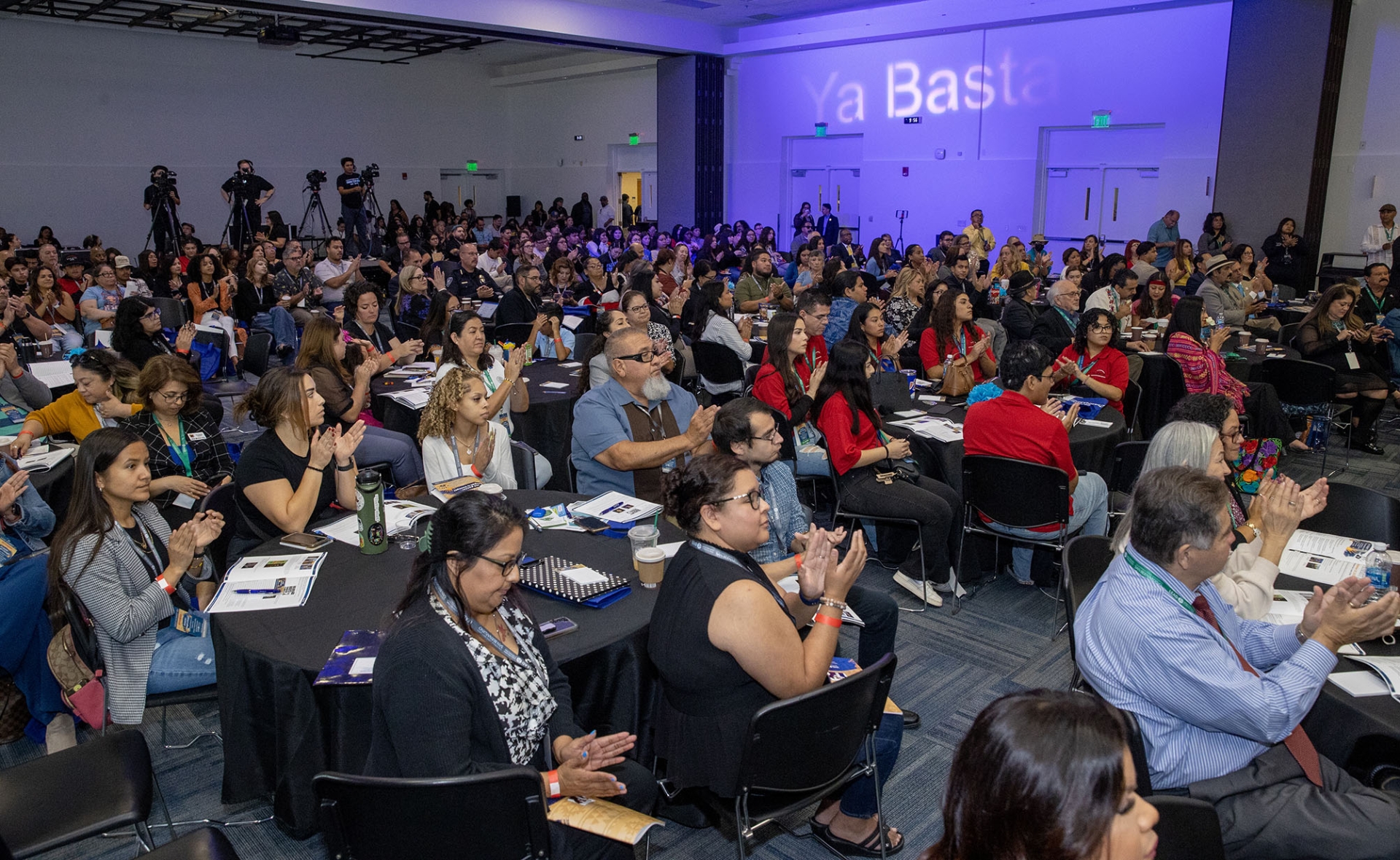
Still, there was an undercurrent of optimism. Morning keynote speaker and madrina de honor (honorary chair), Dolores Huerta, shared ways people can non-violently fight violence, including peaceful protests, civil disobedience and voting in every election.
Tying all that together is education. She said: “The threats that we have – and I’m going to call them the haters, OK? You know, those people out there that say they hate immigrants, they hate women, you know, they hate the LGBT community – you know these people that we’re up against right now, and we know that the only way that we can fight them is through education.
“So you might want to say that all of you who are working in education are the vanguard to save democracy in the United States of America,” Huerta said.
CSUSB President Tomás D. Morales also pointed to education as part of the solution during his welcome address. “I believe strongly that education can play a key role in this area of challenge of fear, and of sorrow, tied especially to our current moment,” he said. “What this year’s summit will give us the opportunity to do is consider the role of education to mitigating crime, violence, and both challenges to, and ways forward to creating and promoting safety.
“Education can play a role in preventing conflict. It holds the promise of promoting peace at both the individual level and at the societal level. Education and safety from violence can no longer be thought of as separate entities.”
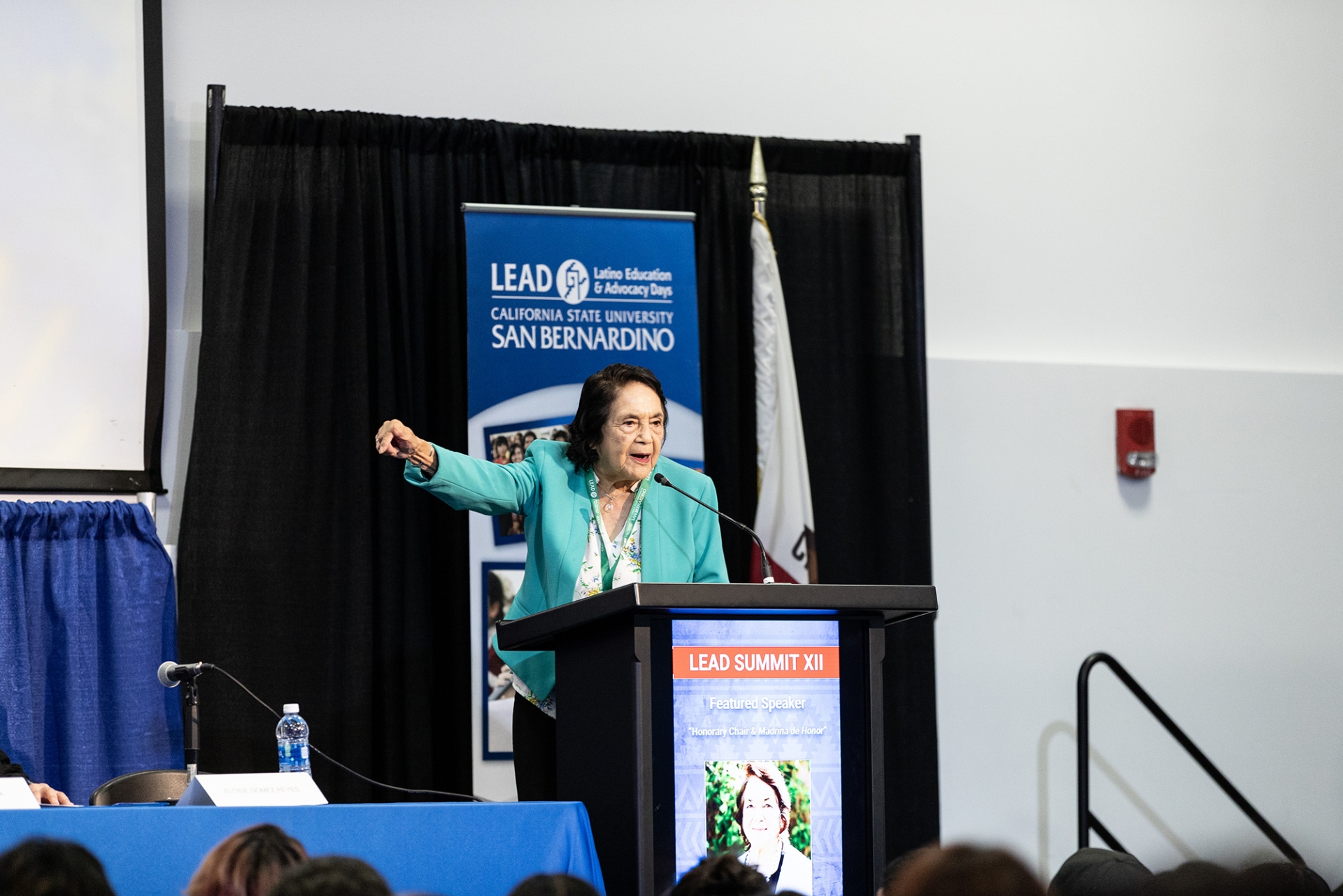
He concluded, “I find myself saying this a lot of late: It is through partnerships and through communities that these partnerships create where we can find solutions. And if we follow this model through the individuals, organizations and entities, which work as part of, or to support, education, we can find and build powerful solutions.”
Actor Emilio Rivera, the padrino de honor and afternoon keynote speaker, shared his emotional journey as he rose up from a violent upbringing in a Los Angeles neighborhood known as “Frogtown” to becoming a successful performer.
In response to a student’s question on how one can overcome a life filled with violence, Rivera said, “Look, I don’t mean this in a bad way – I love my dad with all my heart … I didn’t want to be nothing like my dad because he made me an animal, because I was an animal. … The thing was that I broke that cycle with my kids. I have kids that are 41 and two 42-year-olds, I have a 17-year-old now. But I made it that they would never be like me. I had to break that chain, man.
“Just love,” he said. “It’s so much easier, you know what I’m saying?”
The entire conference can be viewed online, on demand, at “LEAD CSUSB 2023.”
Also, the summit’s featured photo exhibit, “Resilience in Inland Southern California: Enduring Policing, Violence, and Poverty,” by Humberto Flores, has been recreated in a virtual environment and can be viewed online.
Visit the LEAD Summit XII website for more information on the summit and LEAD’s other programs.
